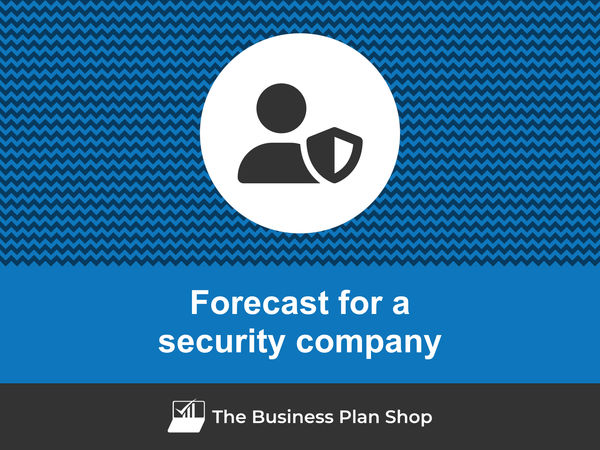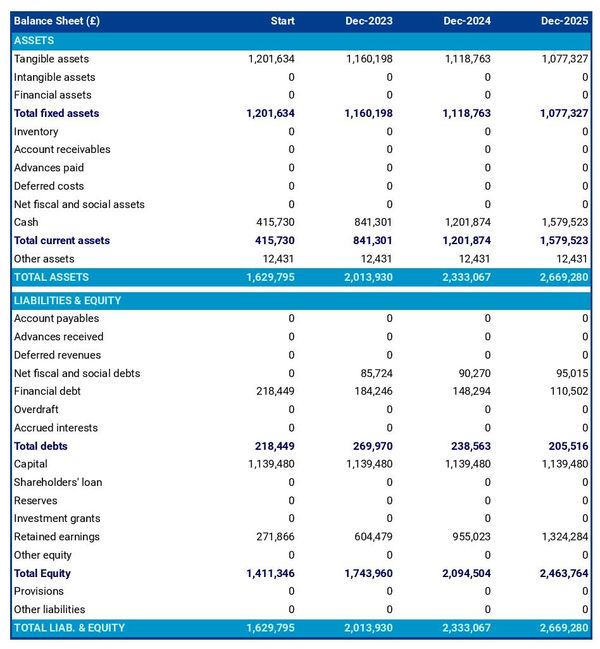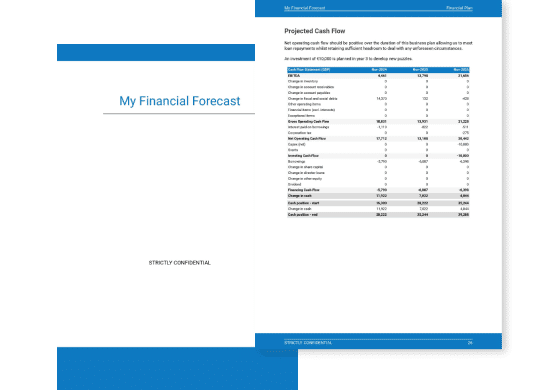How to create a financial forecast for a security company?

If you are serious about keeping visibility on your future cash flows, then you need to build and maintain a financial forecast for your security company.
Putting together a security company financial forecast may sound complex, but don’t worry, with the right tool, it’s easier than it looks, and The Business Plan Shop is here to guide you.
In this practical guide, we'll cover everything you need to know about building financial projections for your security company.
We will start by looking at why they are key, what information is needed, what a forecast looks like once completed, and what solutions you can use to create yours.
Let's dive in!
Why create and maintain a financial forecast for a security company?
Creating and maintaining an up-to-date financial forecast is the only way to steer the development of your security company and ensure that it can be financially viable in the years to come.
A financial plan for a security company enables you to look at your business in detail - from income to operating costs and investments - to evaluate its expected profitability and future cash flows.
This gives you the visibility needed to plan future investments and expansion with confidence.
And, when your trading environment gets tougher, having an up to date security company forecast enables you to detect potential upcoming financing shortfalls in advance, enabling you to make adjustments or secure financing before you run out of cash.
It’s also important to remember that your security company's financial forecast will be essential when looking for financing. You can be 100% certain that banks and investors will ask to see your numbers, so make sure they’re set out accurately and attractively.
Need a solid financial forecast?
The Business Plan Shop does the maths for you. Simply enter your revenues, costs and investments. Click save and our online tool builds a three-way forecast for you instantly.

What information is used as input to build a security company financial forecast?
A security company's financial forecast is only as good as the inputs used to build it.
If you are creating (or updating) the forecast of an existing security company, then you mostly need your accounting information, key historical operating non-financial data, and your team’s input on what to expect for the coming years.
If you are building financial projections for a security company startup, you will need to have done your research and have a clear picture of your competitive environment and go-to-market strategy so that you can forecast sales accurately.
For a new venture, you will also need a precise list of the resources needed to keep the security company running on a day-to-day basis and a list of the equipment and expenditures required to start the business (more on that later).
Let's now take a closer look at the elements that make up your security company's financial forecast.
The sales forecast for a security company
From experience, it is usually best to start creating your security company financial forecast by your sales forecast.
To create an accurate sales forecast for your security company, you will have to rely on the data collected in your market research, or if you're running an existing security company, the historical data of the business, to estimate two key variables:
- The average price
- The number of monthly transactions
To get there, you will need to consider the following factors:
- Increasing demand for security services: As more businesses and individuals become aware of the need for increased security, there may be a higher demand for your company's services. This could lead to an increase in your average price as you may be able to charge higher rates due to the increased demand.
- Technological advancements: As technology continues to advance, there may be new and innovative security solutions that your company can offer to clients. These new solutions may come at a higher price, which could potentially increase your average price per transaction.
- Economic growth: A strong economy can lead to an increase in businesses and individuals seeking to protect their assets. This could result in more monthly transactions for your security company, leading to an increase in revenue.
- Changes in crime rates: A decrease in crime rates could lead to a decrease in the demand for security services, resulting in a lower number of monthly transactions. On the other hand, an increase in crime rates could lead to a higher demand for security services, potentially increasing your average price per transaction.
- Competition: The presence of new or existing competitors in the market could affect your average price and number of monthly transactions. If there are more competitors offering similar services at lower prices, you may need to adjust your prices to remain competitive. This could result in a decrease in your average price. On the other hand, if your company stands out as a leader in the market, you may be able to charge higher prices, resulting in an increase in your average price.
Once you have an idea of what your future sales will look like, it will be time to work on your overhead budget. Let’s see what this entails.
Need inspiration for your business plan?
The Business Plan Shop has dozens of business plan templates that you can use to get a clear idea of what a complete business plan looks like.

The operating expenses for a security company
The next step is to estimate the costs you’ll have to incur to operate your security company.
These will vary based on where your business is located, and its overall size (level of sales, personnel, etc.).
But your security company's operating expenses should normally include the following items:
- Staff Costs: This includes salaries, wages, and benefits for security guards, supervisors, and administrative staff.
- Accountancy Fees: You will need to hire a professional accountant to handle your company's financial records and tax obligations.
- Insurance Costs: As a security company, you will need to have liability insurance to protect your business and your clients in case of any incidents.
- Software Licenses: You will need to invest in security software to manage alarms, monitor surveillance cameras, and track guard patrols.
- Banking Fees: You will incur fees for business bank accounts, credit card processing, and other financial services.
- Vehicle Expenses: If your security company uses vehicles for patrols or transportation, you will need to account for gas, maintenance, and insurance costs.
- Rent/Lease: This includes the cost of renting or leasing office space, storage facilities, and parking for company vehicles.
- Training and Certification: Your security guards will need to undergo training and obtain necessary certifications, which will incur expenses.
- Marketing Expenses: To attract clients, you may need to invest in advertising, website development, and promotional materials.
- Uniforms and Equipment: Your security guards will need uniforms, equipment, and supplies such as radios, flashlights, and first aid kits.
- Utilities: This includes electricity, water, and internet services for your office and any other facilities.
- Legal Fees: You may need to consult with a lawyer for contract reviews, employee disputes, or other legal matters.
- Taxes: Your company will be responsible for paying various taxes, including income tax, sales tax, and payroll taxes.
- Office Supplies: You will need to purchase supplies such as paper, ink, and pens for your office and administrative staff.
- Miscellaneous Expenses: This includes any other unforeseen or miscellaneous expenses that may arise in the operation of your security company.
This list is not exhaustive by any means, and will need to be tailored to your security company's specific circumstances.
What investments are needed to start or grow a security company?
Your security company financial forecast will also need to include the capital expenditures (aka investments in plain English) and initial working capital items required for the creation or development of your business.
For a security company, these could include:
- Security equipment: This includes items such as surveillance cameras, alarm systems, access control systems, and security software. These are essential for providing security services to clients and ensuring the safety of their premises.
- Fleet vehicles: Many security companies require a fleet of vehicles for patrolling and responding to emergencies. These vehicles need to be reliable and equipped with necessary security equipment, such as communication devices and GPS systems.
- Office equipment: This includes items such as computers, printers, scanners, and other office supplies necessary for day-to-day operations. Security companies also need specialized equipment, such as metal detectors and X-ray machines, for screening visitors and their belongings.
- Training facilities: As a security company, it is crucial to invest in continuous training and development of employees to keep up with industry standards and regulations. This may involve setting up a dedicated training facility or renting a space for training purposes.
- Maintenance and repair: Security equipment, vehicles, and office equipment all require regular maintenance and occasional repairs. It is important to budget for these expenses to ensure that all assets are functioning properly and efficiently.
Again, this list will need to be adjusted according to the size and ambitions of your security company.
Need a convincing business plan?
The Business Plan Shop makes it easy to create a financial forecast to assess the potential profitability of your projects, and write a business plan that’ll wow investors.

The financing plan of your security company
The next step in the creation of your financial forecast for your security company is to think about how you might finance your business.
You will have to assess how much capital will come from shareholders (equity) and how much can be secured through banks.
Bank loans will have to be modelled so that you can separate the interest expenses from the repayments of principal, and include all this data in your forecast.
Issuing share capital and obtaining a bank loan are two of the most common ways that entrepreneurs finance their businesses.
What tables compose the financial plan for a security company?
Now let's have a look at the main output tables of your security company's financial forecast.
The projected profit & loss statement
The projected profit & loss shows how profitable your security company is likely to be in the years to come.

For your security company to be financially viable, your projected P&L should ideally show:
- Sales growing above inflation (the higher the better)
- Profit margins which are stable or expanding (the higher the better)
- A net profit at the end of each financial year (the higher the better)
This is for established security companies, there is some leniency for startups which will have numbers that will look a bit different than existing businesses.
The projected balance sheet
The projected balance sheet gives an overview of your security company's financial structure at the end of the financial year.
It is composed of three categories of items: assets, liabilities and equity:
- Assets: are what the business possesses and uses to produce cash flows. It includes resources such as cash, buildings, equipment, and accounts receivable (money owed by clients).
- Liabilities: are the debts of your security company. They include accounts payable (money owed to suppliers), taxes due and bank loans.
- Equity: is the combination of what has been invested by the business owners and the cumulative profits to date (which are called retained earnings). Equity is a proxy for the value of the owner's stake in the business.

The projected cash flow statement
A projected cash flow statement for a security company is used to show how much cash the business is generating or consuming.

The cash flow forecast is usually organised by nature to show three key metrics:
- The operating cash flow: do the core business activities generate or consume cash?
- The investing cash flow: how much is the business investing in long-term assets (this is usually compared to the level of fixed assets on the balance sheet to assess whether the business is regularly maintaining and renewing its equipment)?
- The financing cash flow: is the business raising new financing or repaying financiers (debt repayment, dividends)?
Cash is king and keeping an eye on future cash flows is imperative for running a successful business. Therefore, you should pay close attention to your security company's cash flow forecast.
If you are trying to secure financing, note that it is customary to provide both yearly and monthly cash flow forecasts in a financial plan - so that the reader can analyze seasonal variation and ensure the security company is appropriately capitalised.
Need a solid financial forecast?
The Business Plan Shop does the maths for you. Simply enter your revenues, costs and investments. Click save and our online tool builds a three-way forecast for you instantly.

Which tool should you use to create your security company's financial forecast?
Creating your security company's financial forecast may sound fairly daunting, but the good news is that there are several ways to go about it.
Using online financial forecasting software to build your security company's projections
The modern and easiest way is to use professional online financial forecasting software such as the one we offer at The Business Plan Shop.
There are several advantages to using specialised software:
- You can easily create your financial forecast by letting the software take care of the financial calculations for you without errors
- You have access to complete financial forecast templates
- You get a complete financial forecast ready to be sent to your bank or investors
- You can easily track your actual financial performance against your financial forecast, and recalibrate your forecast as the year goes by
- You can create scenarios to stress test your forecast's main assumptions
- You can easily update your forecast as time goes by to maintain visibility on future cash flows
- You have a friendly support team on standby to assist you when you are stuck
- It’s cost-efficient and much cheaper than using an accountant or consultant (see below)
If you are interested in this type of solution, you can try our forecasting software for free by signing up here.
Calling in a financial consultant or chartered accountant
Enlisting the help of a consultant or accountant is also a good way to obtain a professional security company financial forecast.
The downside of this solution is its cost. From experience, obtaining a simple financial forecast over three years (including a balance sheet, income statement, and cash flow statement) is likely to cost a minimum of £700 or $1,000.
The indicative cost above, is for a small business, and a forecast is done as a one-shot exercise. Using a consultant or accountant to track your actuals vs. forecast and to keep your financial projections up to date on a monthly or quarterly basis will cost a lot more.
If you opt for this solution, make sure your accountant has in-depth knowledge of your industry, so that they may challenge your figures and offer insights (as opposed to just taking your assumptions at face value to create the forecast).
Why not use a spreadsheet such as Excel or Google Sheets to build your security company's financial forecast?
Creating an accurate and error-free security company financial forecast with a spreadsheet is very technical and requires a deep knowledge of accounting and an understanding of financial modelling.
Very few business owners are financially savvy enough to be able to build a forecast themselves on Excel without making mistakes.
Lenders and investors know this, which is why forecasts created on Excel by the business owner are often frowned upon.
Having numbers one can trust is key when it comes to financial forecasting and to that end using software is much safer.
Using financial forecasting software is also faster than using a spreadsheet, and, with the rise of artificial intelligence, software is also becoming smarter at helping us analyse the numbers to make smarter decisions.
Finally, like everything with spreadsheets, tracking actuals vs. forecasts and keeping your projections up to date as the year progresses is manual, tedious, and error-prone. Whereas financial projection software like The Business Plan Shop is built for this.
Need a convincing business plan?
The Business Plan Shop makes it easy to create a financial forecast to assess the potential profitability of your projects, and write a business plan that’ll wow investors.

Use our financial projection templates for inspiration
The Business Plan Shop has dozens of financial forecasting templates available.
Our examples contain both the financial forecast, and a written business plan which presents, in detail, the company, the team, the strategy, and the medium-term objectives.
Whether you are just starting out or already have your own security company, looking at our template is always a good way to get ideas on how to model financial items and what to write when creating a business plan to secure funding.

Takeaways
- Having a financial forecast enables you to visualise the expected growth, profitability, and cash generation for your business over the next three to five years.
- Tracking actuals vs. forecast and keeping your financial projections up-to-date is the only way to get a view on what your security company future cash flows may look like.
- Using financial forecasting software is the mordern and easy way to create and maintain your forecasts.
This is the end of our guide on how to build the financial forecast for a security company, we hope you found it useful. Don't hesitate to contact us if you want to share your feedback or have any questions.
Need inspiration for your business plan?
The Business Plan Shop has dozens of business plan templates that you can use to get a clear idea of what a complete business plan looks like.

Also on The Business Plan Shop
Know someone who owns or is thinking of starting a security company? Share our forecasting guide with them!




